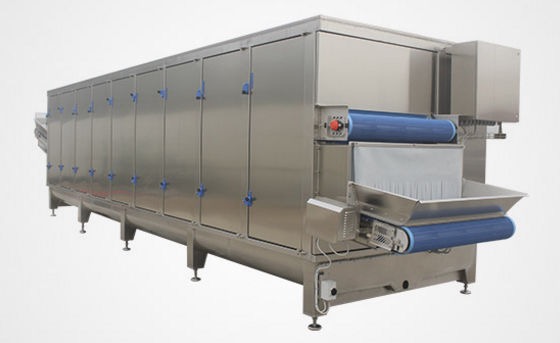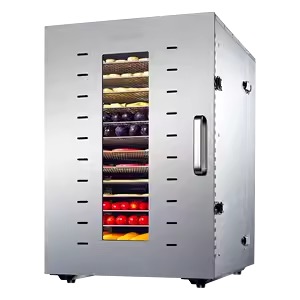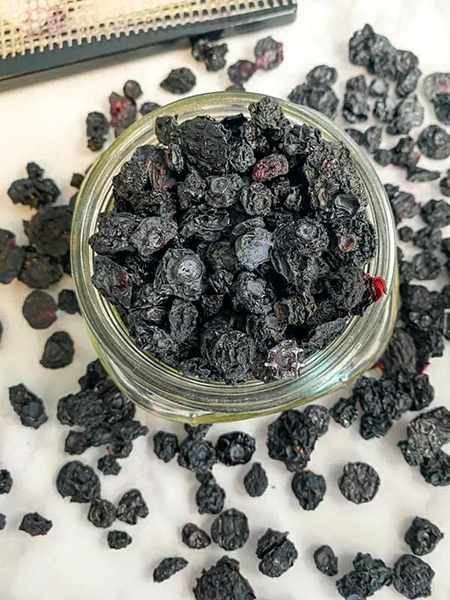
Content Menu
● Understanding Food Drying
● Hang Type Dryers: A Deeper Dive
● Advantages of Hang Type Dryers: In Detail
● Disadvantages of Hang Type Dryers: Considerations
● Rack Dryers: In-Depth Analysis
● Advantages of Rack Dryers: A Closer Look
● Disadvantages of Rack Dryers: Potential Drawbacks
● Factors to Consider When Choosing a Dryer
● Real-World Applications: Case Studies
● Future Trends in Food Drying Technology
● Conclusion
● FAQ
>> 1. What types of foods are best suited for hang type dryers?
>> 2. Are rack dryers more energy-efficient than hang type dryers?
>> 3. How do I determine which dryer is right for my business?
>> 4. Can both types of dryers handle large volumes of food?
>> 5. What maintenance do these dryers require?
● Citations:
Food drying is an age-old preservation technique, essential for extending shelf life, enhancing flavors, and reducing waste. As the demand for dried foods soars, selecting the right drying equipment becomes paramount. This comprehensive article delves into two prevalent types of food dryers: hang type dryers and rack dryers, meticulously examining their advantages and disadvantages to empower businesses in making informed decisions. Whether you're a seasoned food processor or just starting, understanding these distinctions is vital for optimizing your operations.

Understanding Food Drying
Food drying fundamentally involves removing moisture from food products. This process inhibits microbial growth, enzymatic reactions, and other spoilage mechanisms, thereby preserving the food for extended periods. The primary methods include:
1. Hang Type Dryers: These dryers employ a vertical structure where food items are suspended, allowing warm air to circulate around them evenly. This method is particularly well-suited for delicate foods that require gentle handling.
2. Rack Dryers: Also known as cabinet dryers, these involve placing food items on racks within an enclosed chamber. Heated air is circulated throughout the chamber to facilitate drying.
Hang Type Dryers: A Deeper Dive
Hang type dryers are ingeniously designed to maximize vertical space, promoting efficient air circulation around suspended food items. This design makes them an excellent choice for operations where space is at a premium, and gentleness is key.
Advantages of Hang Type Dryers: In Detail
1. Space Efficiency: The vertical configuration optimizes floor space utilization, making hang type dryers ideal for facilities with limited square footage. Their compact design allows for more efficient use of available space, especially valuable in urban or high-rent areas.
2. Gentle Drying Process: The airflow in hang type dryers is carefully calibrated to minimize damage to delicate foods. This gentle approach is crucial for preserving the texture, color, and nutritional value of sensitive items such as herbs, flowers, and thin fruit slices.
3. Energy Efficiency: Hang type dryers generally consume less energy compared to other drying methods. This efficiency is due to effective air circulation, controlled temperature settings, and the ability to target specific areas of the drying chamber. This can lead to significant cost savings over time.
4. Low Maintenance: With fewer moving parts and simpler mechanical systems, hang type dryers typically require less maintenance than rack dryers. This translates to reduced downtime, lower repair costs, and increased operational efficiency.
5. Versatility: Hang type dryers are suitable for a wide range of food products, including fruits, vegetables, herbs, spices, meats, and even flowers. Their adaptability makes them a versatile asset for diverse food processing operations.
Disadvantages of Hang Type Dryers: Considerations
1. Longer Drying Times: Depending on the food type, moisture content, and environmental conditions, drying times in hang type dryers may be longer compared to more aggressive drying methods. This can be a drawback for operations that require rapid processing.
2. Initial Cost: The upfront investment for a high-quality hang type dryer can be higher than some traditional or less sophisticated dryer models. However, the long-term benefits, such as energy savings and reduced maintenance, often offset this initial cost.

Rack Dryers: In-Depth Analysis
Rack dryers, also known as cabinet dryers, are designed to hold food items on racks within a static chamber. Heated air is circulated throughout the chamber, facilitating the drying process. These dryers are often favored for their capacity and relatively fast drying times.
Advantages of Rack Dryers: A Closer Look
1. Faster Drying Times: Rack dryers typically offer quicker drying times due to the more intense application of heat and airflow. This can be a significant advantage for businesses that need to process large volumes of food quickly.
2. Higher Capacity: Rack dryers can accommodate larger volumes of food at once, making them ideal for high-demand operations and large-scale production. Their ability to process significant quantities of food efficiently makes them a valuable asset for commercial food processing facilities.
3. Robust Design: Rack dryers are generally more durable and built to withstand the demands of industrial applications. Their sturdy construction ensures longevity and reliability, even under heavy use.
Disadvantages of Rack Dryers: Potential Drawbacks
1. Space Consumption: Rack dryers require more floor space compared to hang type dryers. Their larger footprint can be a limiting factor for businesses with space constraints.
2. Higher Energy Consumption: Rack dryers often consume more electricity due to the heating elements and fans involved in circulating hot air. This can result in higher energy bills and increased operational costs.
3. Potential Damage to Delicate Foods: The more aggressive airflow in rack dryers can potentially damage delicate foods, leading to loss of quality and reduced market value. Care must be taken when drying sensitive items in rack dryers.
Factors to Consider When Choosing a Dryer
Selecting the right food dryer involves careful consideration of several key factors:
1. Type of Food: Different foods require different drying conditions. Delicate items like herbs and flowers benefit from the gentle airflow of hang type dryers, while heartier foods like fruits and vegetables can withstand the more intense heat of rack dryers.
2. Volume Requirements: Assess your production volume needs. Rack dryers are generally better suited for high-volume operations, while hang type dryers are ideal for smaller-scale or specialty food processing.
3. Energy Efficiency Goals: Evaluate your energy consumption goals. Hang type dryers are typically more energy-efficient, which can lead to significant cost savings over time.
4. Budget Constraints: Consider your budget limitations. The initial cost of a hang type dryer may be higher, but the long-term savings on energy and maintenance can make it a worthwhile investment.
5. Available Space: Assess the available floor space in your facility. Hang type dryers are more space-efficient, making them suitable for businesses with limited room.
Real-World Applications: Case Studies
To illustrate the practical applications of hang type and rack dryers, consider the following case studies:
1. Case Study 1: Herb Farm: An herb farm specializing in organic dried herbs uses hang type dryers to preserve the delicate flavors and aromas of their products. The gentle airflow ensures that the herbs retain their essential oils and vibrant colors, resulting in high-quality dried herbs that command premium prices.
2. Case Study 2: Fruit Processing Plant: A fruit processing plant that produces dried fruit snacks relies on rack dryers to quickly and efficiently dry large volumes of fruit. The faster drying times enable the plant to meet high demand and maintain consistent product quality.
Future Trends in Food Drying Technology
The field of food drying technology is constantly evolving. Some emerging trends include:
1. Advanced Sensor Technology: Integration of sensors to monitor and control temperature, humidity, and airflow in real-time, optimizing the drying process and ensuring consistent product quality.
2. Smart Controls: Implementation of smart controls that automatically adjust drying parameters based on the type and volume of food being processed, minimizing energy consumption and maximizing efficiency.
3. Hybrid Systems: Development of hybrid drying systems that combine the advantages of both hang type and rack dryers, offering versatility and optimized performance.
Conclusion
Choosing between hang type and rack dryers depends on a variety of factors, including the type of food being dried, volume requirements, energy efficiency goals, budget constraints, and available space.
Hang type dryers excel in preserving delicate foods with gentle airflow and lower energy consumption, making them ideal for smaller-scale operations and specialty food processing. Rack dryers, on the other hand, are better suited for high-volume production with faster drying times, catering to larger commercial enterprises.
By carefully evaluating your specific needs and priorities, you can select the food dryer that best aligns with your business objectives, optimizing your operations and ensuring the production of high-quality dried foods.

FAQ
1. What types of foods are best suited for hang type dryers?
Hang type dryers are ideally suited for delicate foods such as herbs, flowers, thin fruit slices, and certain meats that require gentle airflow to maintain their quality, aroma, and nutritional value.
2. Are rack dryers more energy-efficient than hang type dryers?
No, generally, hang type dryers consume less energy due to their efficient design and operation compared to rack dryers. Rack dryers often require more energy to heat the air and circulate it throughout the drying chamber.
3. How do I determine which dryer is right for my business?
To determine the right dryer for your business, carefully consider factors such as the types of food you process, required drying times, energy costs, space availability, budget constraints, and production volume.
4. Can both types of dryers handle large volumes of food?
Yes, but rack dryers typically have higher capacity and are better suited for high-volume production needs compared to hang type dryers. Hang type dryers are more appropriate for smaller-scale operations or specialty food processing.
5. What maintenance do these dryers require?
Hang type dryers usually require less maintenance due to fewer moving parts and simpler systems. Rack dryers may need more frequent upkeep due to their complex heating and airflow systems. Regular cleaning and inspection are essential for both types of dryers to ensure optimal performance and longevity.
Citations:
[1] https://www.dryeratech.com/hang-type-vs-traditional-dryers-which-is-better.html
[2] https://www.foxydry.com/blogs/articles-and-news/electric-laundry-rack-what-is-it-and-how-does-it-work
[3] https://patents.google.com/patent/CN111118860A/zh
[4] https://www.reddit.com/r/simpleliving/comments/gm3yzw/dryer_vs_drying_rack/
[5] https://www.tomsguide.com/face-off/clothes-dryer-vs-clothes-rack-dryer-which-is-better
[6] https://patents.google.com/patent/WO2012108692A2/ko
[7] https://www.hoz.sg/blog/dryer-vs-automated-laundry-racks-which-one-works-better-for-you
[8] https://www.hometrust.sg/articles/automated-laundry-racks-vs-dryers-what-works-better/











